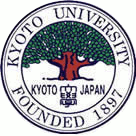セミナー案内
- 日時
- 6月 18日 (水), 13:30-
- 場所
- Hybrid style (Room 413) ZOOMのリンクについてはtanaka.hiroto.54z[@]st.kyoto-u.ac.jp([]を外す)までご連絡ください。
- 講演者
- Dr. Indrasen Ghosh (Indian Institute of Technology Kharagpur)
- タイトル
- "Introduction to entanglement in the Sachdev-Ye-Kitaev model at Large-N "
Abstract: The Sachdev-Ye-Kitaev (SYK) [1-2] model serves as a key solvable paradigm for studying quantum chaos, holography, and entanglement dynamics. We present an introductory analysis of the SYK model and its variants, employing numerical [3] exact diagonalization for finite-N systems and (primarily) analytical large-N techniques. The large-N formalism is developed, leading to the derivation of the effective action and saddle-point equations, accurately capturing thermodynamic properties like the non-zero residual entropy. We investigate the second Rényi entropy using both exact diagonalization and the large-N replica trick, comparing results and examining thermal versus entanglement contributions across different temperatures and subsystem sizes. Furthermore, we study entanglement dynamics in a coupled SYK4 system. Applying the replica method to this setup reveals the existence of distinct saddle point solutions, including replica-diagonal configurations and, significantly, replica wormholes where correlations form between initially disconnected replica contours. The competition between these saddles can lead to phase transitions in the Rényi entropy dynamics. This explicit realization of replica wormholes [4] in a controlled setting provides valuable insights into entanglement structure in chaotic systems and strengthens connections to gravitational path integrals and the black hole information paradox. References: [1] S. Sachdev and J.-w. Ye, “Gapless spin fluid ground state in a random, quantum Heisenberg magnet,” Phys. Rev. Lett. 70 (1993) 3339. [2] A. Kitaev, “A simple model of quantum holography.” http://online.kitp.ucsb.edu/online/entangled15/kitaev/,http: //online.kitp.ucsb.edu/online/entangled15/kitaev2/. Talks at KITP, April 7, 2015 and May 27, 2015. [3] J. Maldacena and D. Stanford, “Remarks on the Sachdev-Ye-Kitaev model,” Phys. Rev. D94 (2016) 106002. [4] G. Penington, S. H. Shenker, D. Stanford, and Z. Yang, (2019).


